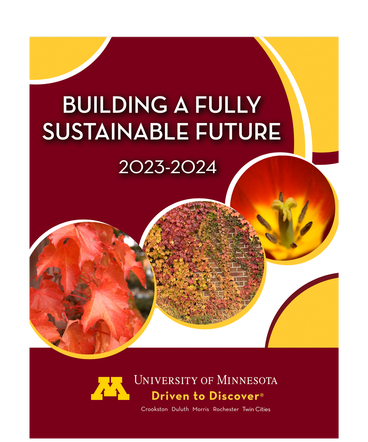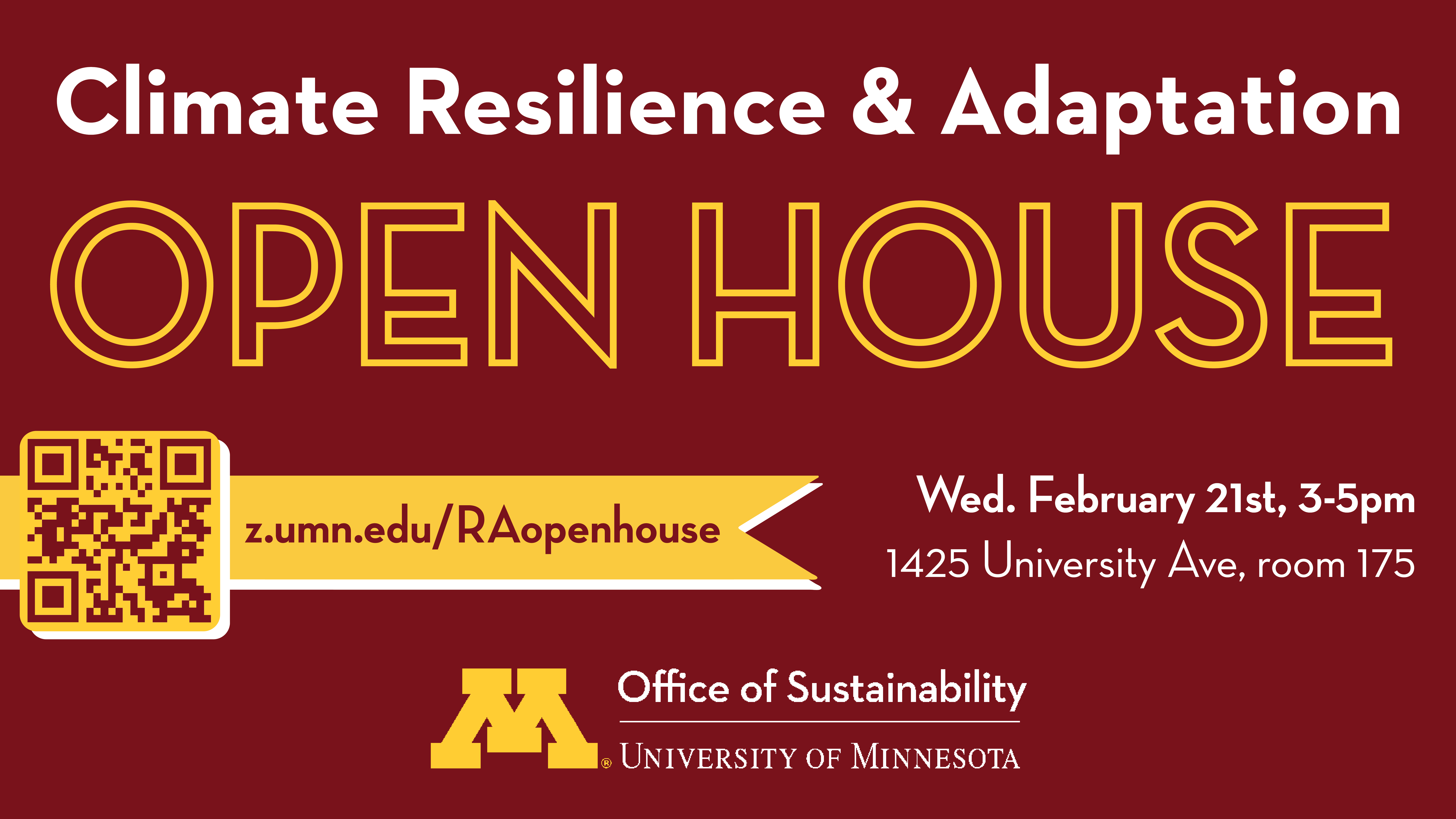
Describe your position at the University
Hugh Reichert is the Custodial Training Manager for Facilities Management and has been in that position the past 7 years. He works with no specific team in Facilities Management but creates and delivers quality training to the custodial staff. He works with all the custodial staff in a sense, which is about 500 staff members, but specifically leads the training for all new custodial employees. Sustainability is referenced in every topic of the training. He provides refreshers on winter training related to shoveling practices for shoveling snow. He also provides training for student custodians as well as Senior workers (B&Gs) when they are promoted to their new role. He states that “every training has a sustainability component even if it is not outright or directly sustainability.”
Describe the custodial department
The structure of the Custodial Service team has 5 Associate Directors responsible for one of the 5 districts: East Bank, Health Services, HRA, St. Paul, and West Bank. Next, there is a Team Manager who works for the Associate Director, responsible for the buildings themselves in both maintenance and custodial aspects. Next, the Supervisors work for the Team Manager and manage custodial teams. The custodial teams are made up of 15-40 custodial staff. In the custodial staff there are squads of 4-5 people that are assigned to specific buildings. For example, Moos Tower has 1 Supervisor, so that team and squad only works there. Most squads clean 1-2 buildings a day. Squad members rotate jobs weekly on 1) restroom tech 2) point tech that does trash, dust, and wiper duties 3) vacuuming tech and 4) utility tech that does entries, common spaces, etc. duties. Overall the services the custodial department provides are:
- Remove waste/recycling, clean/sanitize surfaces, vacuum/mop floors, replace lamps, shovel/salt entryways.
- Deep clean any surface, shampoo extract carpets, strip/scrub/refinish floors, polish stone, pressure wash.
- Service special events, perform construction cleans, clean up after floods and water events.
What does sustainability mean in custodial work?
“Sustainability is on every level, whether it is a primary or secondary focus. Sustainability shows up in all the different forms.” It starts when they walk into a room to perform their routine cleaning tasks:
- They use the mildest cleaning chemical possible to do the job
- They use Microfiber Cloths to wipe/dust everything
- These cloths can be laundered and reused
- Microfiber holds more soil than other forms so it does a better job of cleaning without chemicals
- They don't automatically change the waste container liner unless its soiled or torn
- They reuse the liner until its compromised
- They use a battery powered vacuum cleaners when possible
- They use Green Seal Certified chemicals
- They utilize dispensing systems
- Ensures chemical products are not stronger than needed and are not over using chemicals
- In the higher level they moving away from using floor finish
- Floor finish is similar to wet plastic on the floor, that dries and comes hard
- To take it off you need harsh chemicals to remove it
- Therefore moving away from this and using different floor techniques is more sustainable
Sustainability is deeply embedded into what they do. One sustainable practice is the use of Microfiber Cloths that can be reused in real time. They use them to clean various surfaces, and can rinse it out with water and reuse it again in the same day. It can also be laundered multiple times to be reused. This cuts down on single use paper towels, plastics etc. Even though paper towels may be compostable, they are only single use. The brown restroom paper roll towels are Green Seal Certified made from 100% recovered material and at least 50% post consumer recycled content. Hugh trains staff to fold and use all 8 sides of the Microfiber cloth to get the most out of the cloth before it must be rinsed or laundered. “A reusable practice, getting more use out of each towel before it gets rinsed and cleaned.” All of their mops and dusters are also laundered microfiber for maximum performance and reduced waste.
Hugh works to train people to manage waste sustainably. They have specific practices that incorporate sustainability. For example, when emptying paper trash, it is only emptied once a week unless it's very full. Normally they dump the paper and leave the liner. They use compostable liners with the insert and don't change the liner unless it's soiled. This practice uses less materials and wastes less liners. With the compostable containers, Hugh trains employers and gives them tools so that when they see a compostable container with contaminants in them, they are trained to remove the contaminants and put them in the proper waste container. This reduces contaminants in the compost stream and contributes to waste reduction, increased composting, and overall more sustainable waste recovery on campus. Additionally, even the regular trash, plastic waste, and recycling liners are made from at least 70% recycled content and are custom sized to fit the receptacles perfectly.
The University has done, and continues to do, the research to select chemicals that are safe as they can be to still get the job done. They use the mildest cleaning chemicals possible that still can do what they are needed to do. Their routine core cleaning solutions from 3M are Green Seal Certified and come in sealed bottles of concentrate that only dispense through a Twist-n-Fill dilution control system. This prevents direct contact with concentrates and properly dilutes the product every time. This is a concentrate that makes hundreds of gallons of cleaning product, mixes with the water to make the chemical diluted, and cuts down on waste. It is refillable and reusable for the bottle, which is more sustainable than having to replace each bottle after the product is gone. Many cleaning products you have to waste the bottle, so this method of 128 gallons of a product saves 516 quart bottles by the dispensing systems. This saves plastic, money, energy, etc. from being wasted.
Another way sustainability shows up in custodial work is the train on salting and Ice Melt. This covers the costs, safety, and environmental impacts of ice melt, the process and why they want to reduce use. Additionally, for floors, the Diversey floor finish stripper is Green Seal certified and safely dispenses from their RTD bottle at the proper dilution without any manual mixing. Lastly, the 3M scrubbing pads that are used on floor machines are Green Seal certified.
What message do you want students to take away from your work with sustainability in custodial services?
“We as a custodial program and our custodial staff put a considerable amount of focus into being sustainable and practicing sustainability in what we do.” Real time in the moment, they focus on being sustainable at every turn and do put a considerable amount of thought and effort into sustainability in their routine work. “Sustainability really is a part of virtually everything we do.” As stewards of health and safety, they work hard to make sustainably smart choices in product selection and procedural practices.
Click here for a waste sorting guide to help us get as close as possible to Zero Waste!
Source:
https://facilities.umn.edu/our-services/fm-teams/custodial-services



